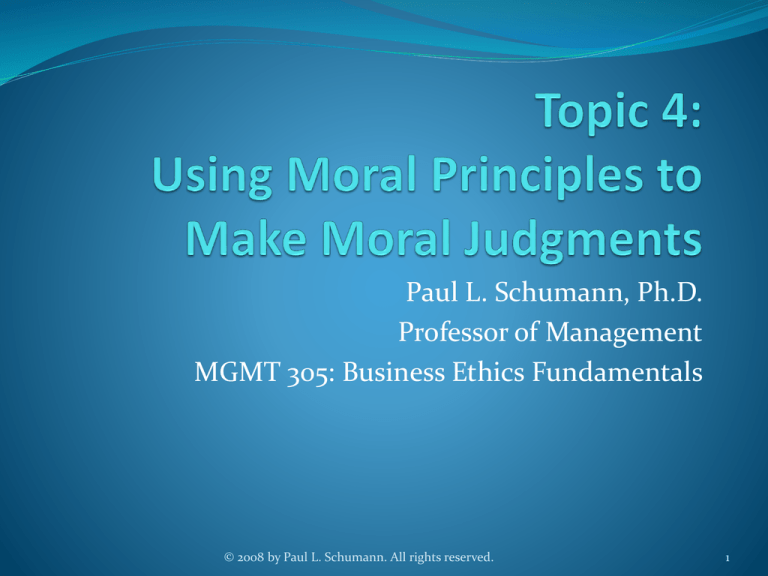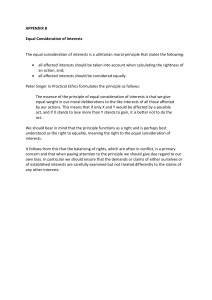
Paul L. Schumann, Ph.D.
Professor of Management
MGMT 305: Business Ethics Fundamentals
© 2008 by Paul L. Schumann. All rights reserved.
1
Outline
Use Five Moral Principles to Make Moral Judgments:
Utilitarian Principle
Rights Principle
Distributive Justice Principle
Ethics of Care Principle
Virtue Ethics Principle
Make the Moral Judgment:
Do the 5 moral principles reach the same conclusion?
If so, then that’s the moral judgment
If not, resolve the conflict of moral principles
2
Utilitarian Moral Principle
The ethical action is the one that will maximize everyone’s
happiness
Method 1: What action will do the most good and the least
harm for everyone who is affected by the action?
Evaluate the good and harm done to each stakeholder for each
possible action
The ethical action is the one that does the most good and the least
harm to everyone considered together
Method 2: What would happen in a competitive free market
in which all stakeholders have complete and accurate
information and are free to make their own choices in
mutually beneficial negotiations with each other
3
Utilitarian Moral Principle
Example: Is it ethical to deceive employees about
hazardous chemicals they use on their jobs?
Method 1: Will deceiving employees maximize
everyone’s happiness? No, because …
Employees are put at risk of harm because they don’t know
about the hazardous chemicals and how to use them safely
Neighbors are put at risk of harm because employees don’t
know how to safely handle spills or other accidents with the
chemicals
Stockholders are put at risk of harm because profits would be
threatened by a mishandled accident with the chemicals
4
Utilitarian Moral Principle
Method 2: The deception is unethical on utilitarian
grounds because employees have not voluntarily agreed
to work with the hazardous chemicals
The deception has led them to accept a job that may not be
optimal for them
Conclusion: Therefore, the deception is unethical on
utilitarian grounds because it does not maximize
everyone’s happiness
What would be ethical on utilitarian grounds would be for
employees to be fully informed and to have the proper
equipment and training to safely work with the hazardous
chemicals
5
Rights Moral Principle
The ethical action is the one that you have the moral
right to take, that does not infringe on the moral rights
of others, and that advances the moral rights of others
Do you have a moral right to take the action in question?
Reversibility: Would you be willing to have the action done
to you if the roles were reversed?
Universalizability: Are you willing to live in a world, can you
even conceive of a world, in which everyone did the action all
the time?
Respect & free consent: Are you treating people with respect
and in ways that they’ve freely consented to be treated?
6
Rights Moral Principle
What moral rights do other stakeholders have?
Reversibility
Universalizability
Respect & free consent
Are there conflicts among the moral rights that you and the
other stakeholders have?
If there are conflicts of moral rights, whose moral rights should take
precedence?
What competing interests are being protected by each conflicting
right?
Which competing interest is more important?
Give precedence to the right that protects the more important
interest
7
Rights Moral Principle
Example: Is it ethical to deceive employees about
hazardous chemicals they use on their jobs?
Your moral rights as supervisor: Do you (as the
supervisor) have a moral right to deceive employees
about the hazardous chemicals on their jobs?
Reversibility: Reverse roles and put yourself in the shoes of an
employee
If you wouldn’t like it if you were the employee and your
supervisor deceived you about the chemicals you were using on
your job, then when you’re the supervisor you don’t have the
moral right to deceive your employees
8
Rights Moral Principle
Universalizability: Would you want to live in a world, can you
even conceive of a world, in which all supervisors in all
companies always deceive their employees about hazardous
chemicals on the employees’ jobs?
Such universal deception of employees would so erode trust as
to make people afraid to take jobs
If the action can’t be universalized, then you don’t have a
moral right to take the action
Respect & free consent: The employees have not freely
consented to be deceived about the hazardous chemicals
To deceive employees therefore does not treat employees with
respect
9
Rights Moral Principle
Employees’ moral rights: Do employees have a moral
right complete and accurate information about chemical
hazards on their jobs?
Reversibility: Reverse roles and put yourself in the shoes of an
employee
If you were the employee and you would want to be fully
informed, then employees have a moral right to accurate
information about the chemical hazards
Universalizability: We can imagine a world in which all
employees are always given complete and accurate
information about job hazards
10
Rights Moral Principle
Respect & free consent:
To fully inform employees of job hazards is to treat them with
respect
If employees are fully informed of the job hazards and they
still voluntarily agree to do the job, then they have consented
Moral rights of other stakeholders?
Neighbors: Their interest is in living next door to a safe
business that won’t harm them with dangerous chemical leaks
Apply reversibility, universalizability, & respect/free consent
Deceiving employees thus infringes on the moral rights of
the neighbors
11
Rights Moral Principle
Conclusions:
You (as a manager) do not have a moral right to deceive your
employees about the hazardous chemicals that they use on
their jobs
Employees have a moral right to complete and accurate job
information, including about hazardous chemicals
Neighbors have a moral right to live next to a business that
won’t harm them with dangerous chemical leaks
To deceive employees about hazardous chemicals is therefore
unethical because it infringes on the moral rights of
employees and neighbors
12
Distributive Justice Moral Principle
The ethical action is the one that produces a fair
distribution of benefits (good) and costs (harm) for all
of the stakeholders
Rawlsian Principles of Distributive Justice:
Equal Liberty Principle: What action provides all
stakeholders with the same (equal) basic rights and freedoms?
Equal Opportunity Principle: What action provides all
stakeholders with the same opportunities to be successful in
life, and rewards people with benefits and costs based on their
contributions?
Difference Principle: What action helps those in need as
much as possible in a way that the help to the needy is
sustainable?
13
Distributive Justice Moral Principle
Example: Is it ethical to deceive employees about
hazardous chemicals they use on their jobs?
Equal Liberty Principle: From the previous analysis of
the Rights moral principle, we decided that employees
have a moral right to accurate information about job
hazards
So, all employees should have that basic moral right
14
Distributive Justice Moral Principle
Equal Opportunity Principle: For all employees to
have an equal opportunity to be successful in life
through their efforts and hard work, they need accurate
job information so they can make informed decisions
about which job to accept
Deceiving employees about job hazards thus interferes with
equal opportunities
Employees who have accurate information about job hazards
would have a better chance to be successful than employees
who have been deceived about job hazards
15
Distributive Justice Moral Principle
Difference Principle: Employees need accurate
information about jobs and companies are able to
provide such information in a sustainable way
Deceiving employees about the hazardous chemicals thus
denies employees what they need
Conclusion: Deceiving employees about the hazardous
chemicals is unethical because it is unfair to employees
16
Ethics of Care Moral Principle
The ethical action is the one that appropriate cares for
the individuals with whom you have relationships
You need to appropriately care for your own needs
You need to appropriately care for the needs of the
individuals with whom you have relationships
Personal relationships: Provide appropriate care to family,
friends, coworkers, etc.
Professional relationships: Provide appropriate care to
employees, customers, stockholders, etc.
You do not need to care for relationships involving
oppression, exploitation, violence, disrespect, etc.
17
Ethics of Care Moral Principle
Example: Is it ethical to deceive employees about
hazardous chemicals they use on their jobs?
As a manager, you have a relationship with employees,
customers, stockholder, and the neighbors of the
business
If you deceive the employees about the hazardous chemicals,
then they don’t have the knowledge, training, or equipment to
handle the chemicals safely
This puts employees, customers, stockholders, and the
neighbors in a vulnerable position
You haven’t appropriate cared for them
18
Ethics of Care Moral Principle
Appropriate care would be to provide the employees with
complete and accurate information about the hazardous
chemicals and with the proper safety equipment and training
to handle the chemicals safely
With the appropriate information, equipment, and training,
the employees would be better able to safely handle any
chemical spills or other problems that might threaten the
business
A mishandled spill would threaten employees, customers,
stockholders, and the neighbors
Conclusions: Deceiving the employees is unethical
because it does not appropriate care for the individuals
with whom you have relationships
19
Virtue Ethics Moral Principle
The ethical action is the one that display good
character virtues, and that does not display bad
character vices
Take the action that displays virtues: benevolence,
civility, compassion, conscientiousness, cooperativeness,
courage, fairness, generosity, honesty, industriousness,
loyalty, moderation, self-control, self-reliance, tolerance,
etc.
Do not take the action that displays vices: cowardice,
deceit, dishonesty, laziness, neglect, selfishness, etc.
20
Virtue Ethics Moral Principle
Example: Is it ethical to deceive employees about
hazardous chemicals they use on their jobs?
How would we describe the character of a manager who
deceives employees about dangerous chemicals?
Liar, deceiver, dishonest, cheater, uncaring, short-sighted, etc.
These character traits are vices, not virtues
Conclusions: Deceiving employees about the hazardous
chemicals is unethical because it display vices and not
virtues as character traits
21
Make the Moral Judgment
Do all 5 moral principles reach the same conclusion?
All 5 moral principles agree:
If all 5 principles conclude the action is ethical, then you are
on firmer ground to judge that the action is ethical
If all 5 principles conclude the action is unethical, then you
are on firmer ground to judge that the action is unethical
Example: Is it ethical to deceive employees about hazardous
chemicals they use on their jobs?
We’ve seen that all 5 moral principles can be used to reach
the moral judgment that it is unethical to deceive employees
about hazardous chemicals they use on their jobs
22
Make the Moral Judgment
The 5 moral principles disagree:
Use your moral imagination: use the moral principles, and the
nature of the apparent conflict among the moral principles, to
try to invent a previously unconsidered action that all 5 moral
principles would judge as being ethical
If no action can be found that all 5 moral principles would
judge as being ethical, then use your values to decide which
moral principles should take precedence
Example: “The ends can never justify the means”
This says that the Rights Principle takes precedence over the
Utilitarian Principle
23
Outline
Use Five Moral Principles to Make Moral Judgments:
Utilitarian Principle
Rights Principle
Distributive Justice Principle
Ethics of Care Principle
Virtue Ethics Principle
Make the Moral Judgment:
Do the 5 moral principles reach the same conclusion?
If so, then that’s the moral judgment
If not, resolve the conflict of moral principles
24







